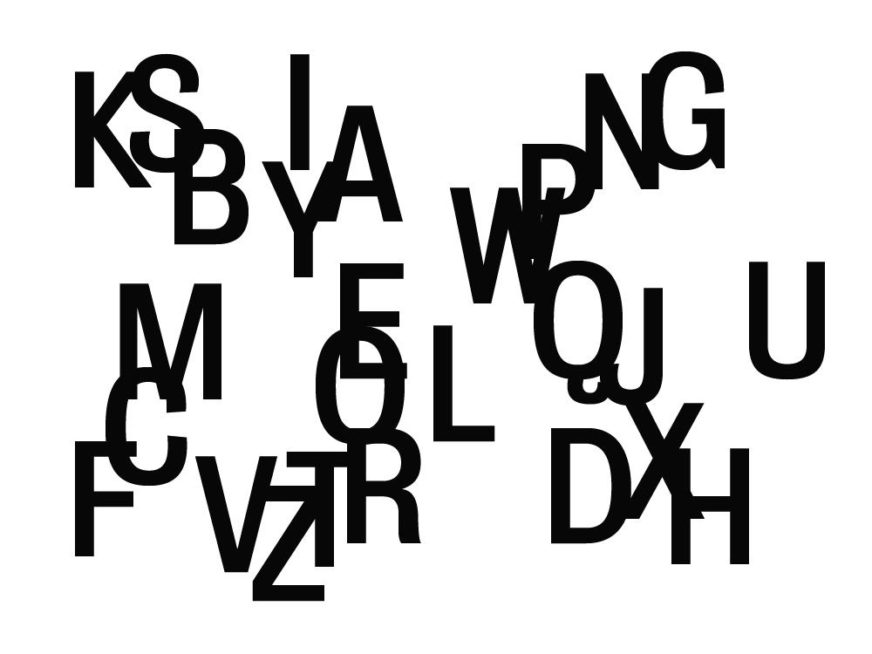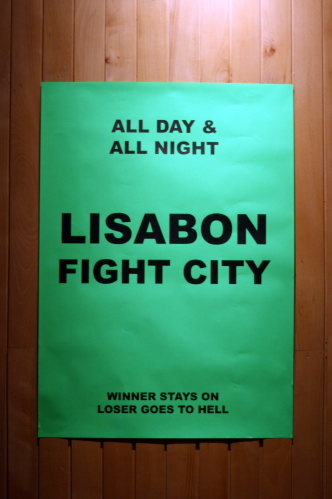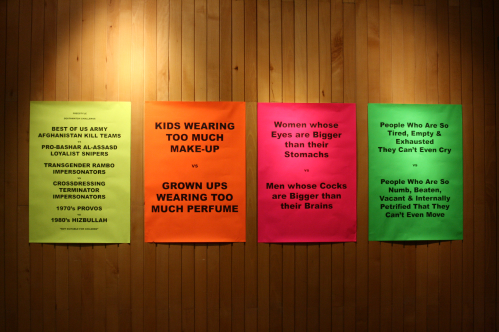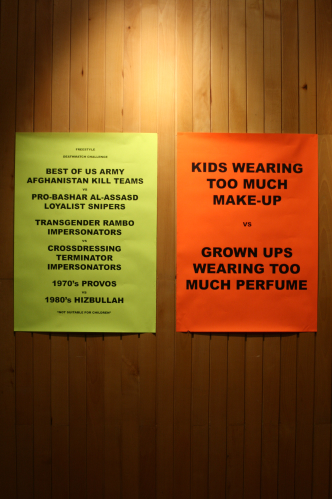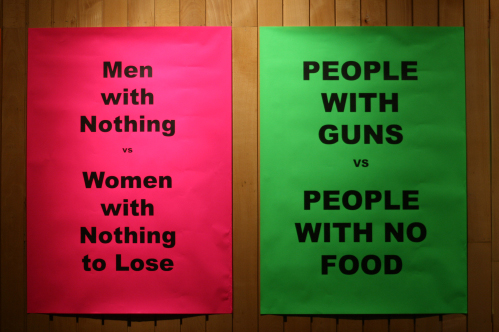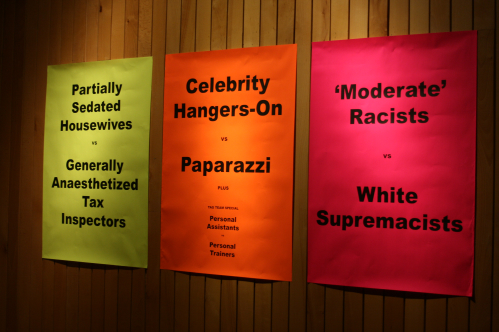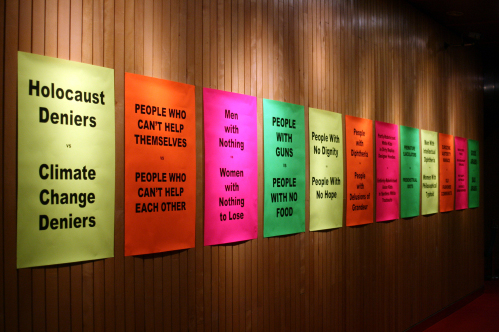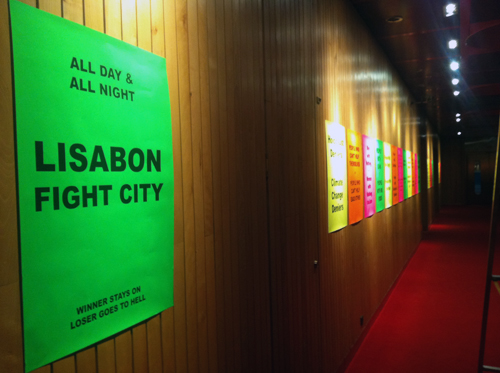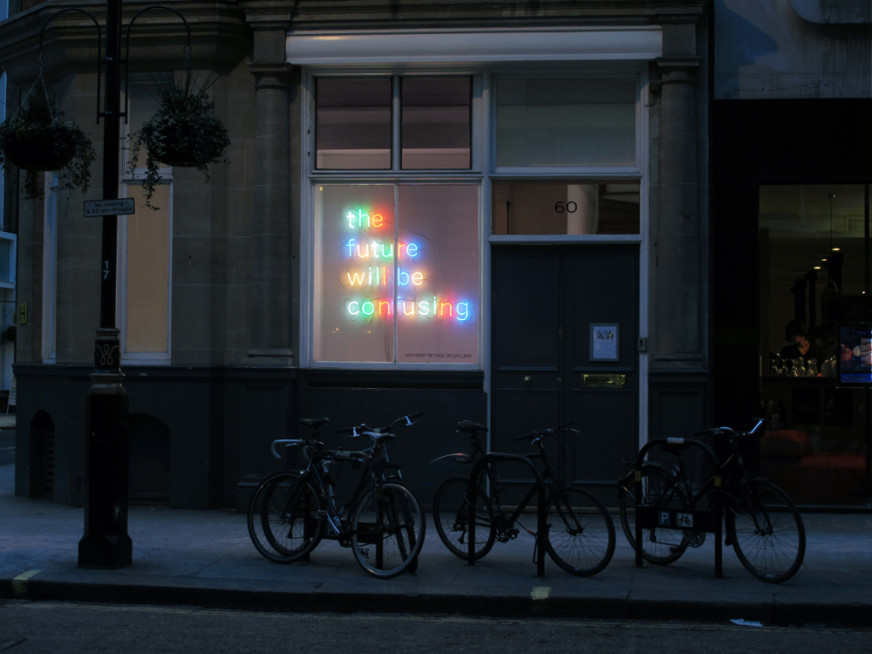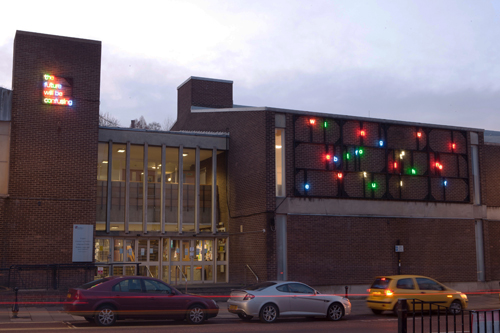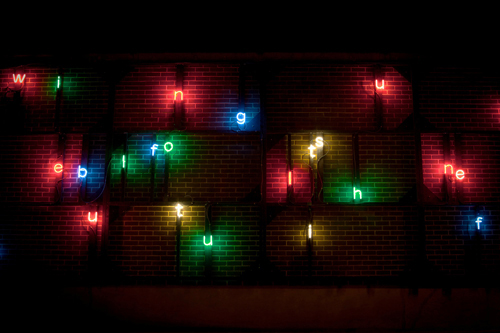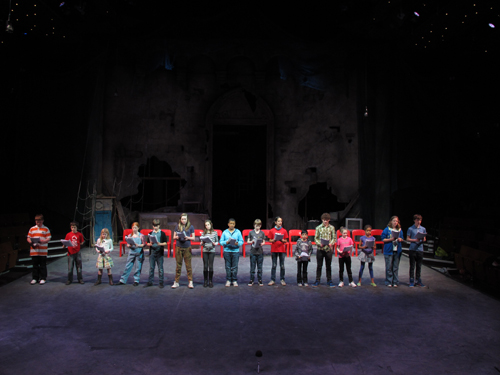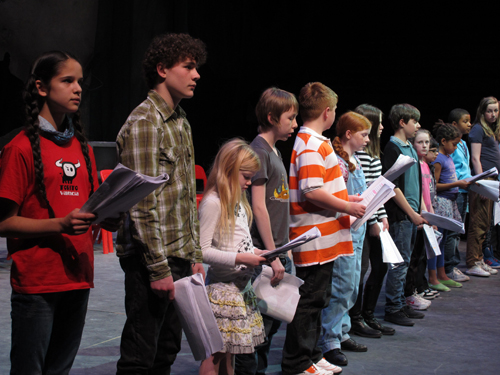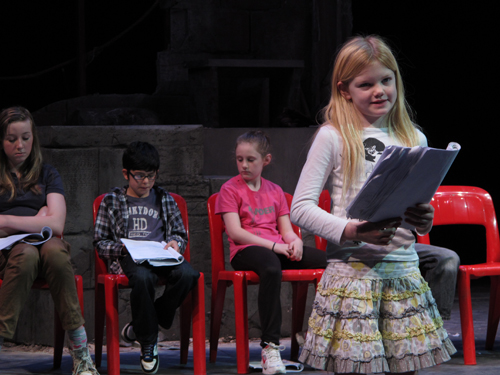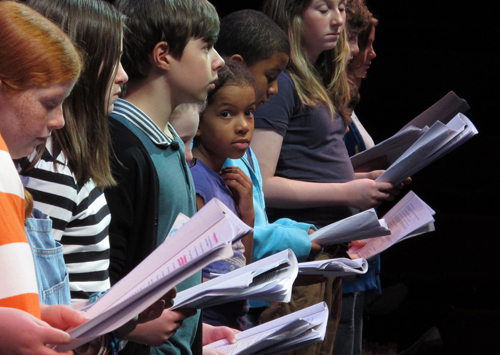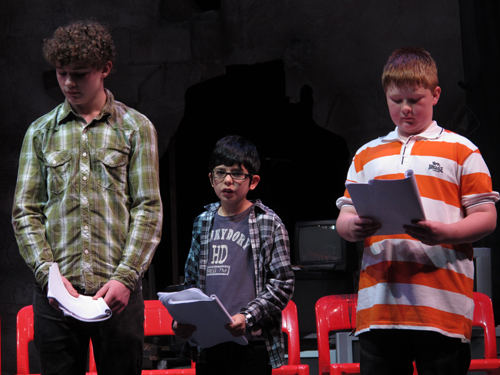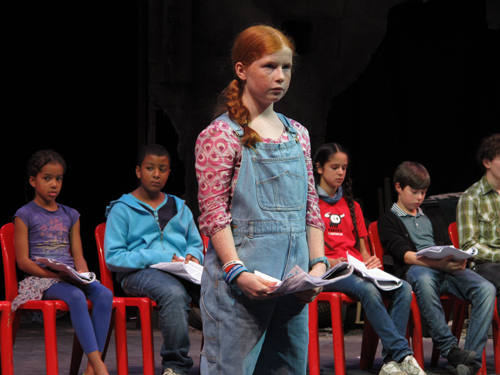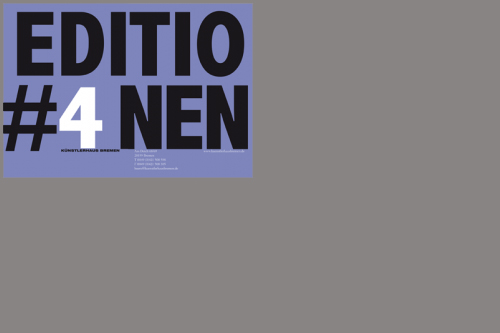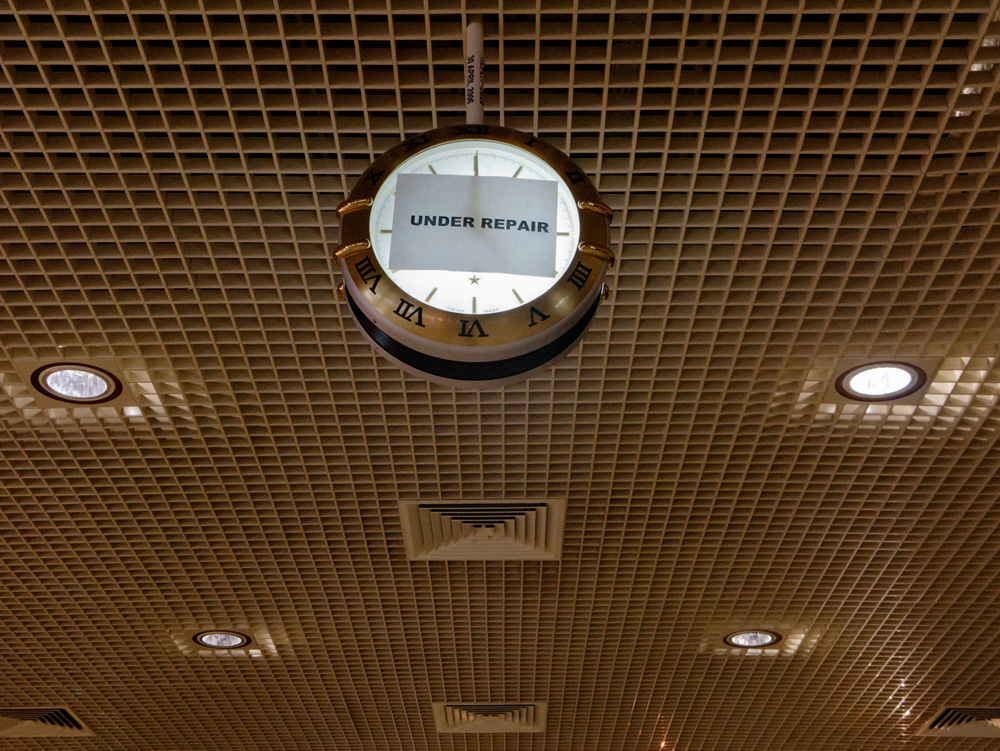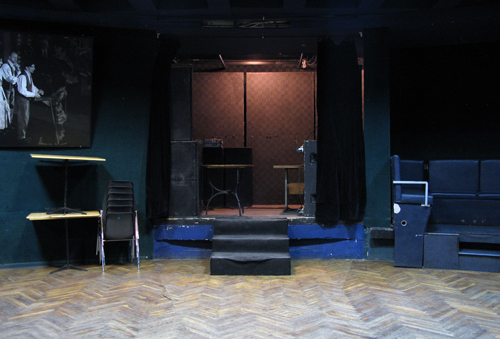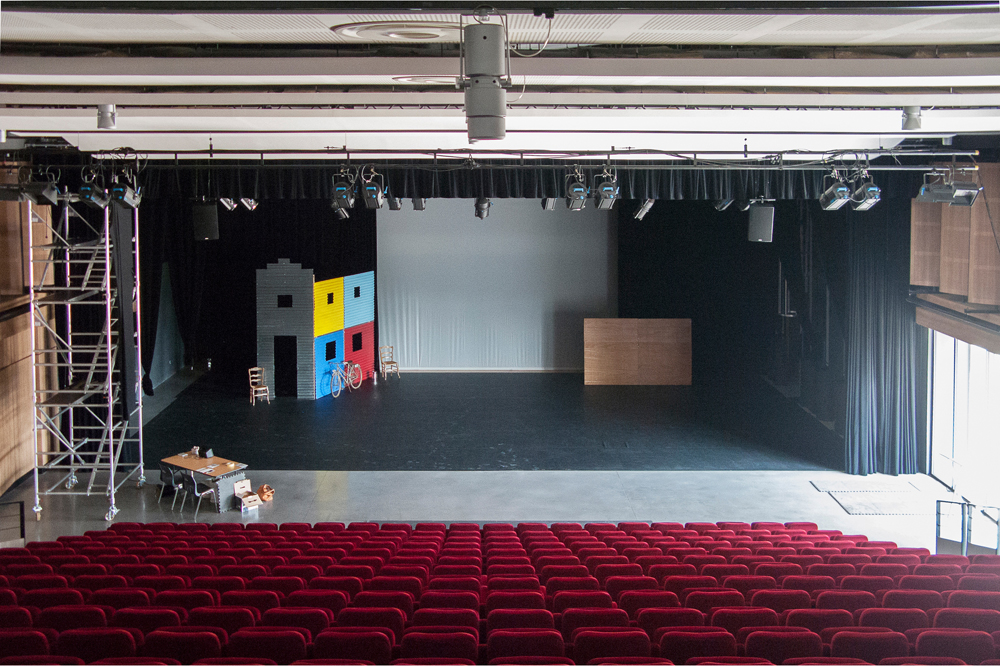Late at night, after the show’s ended and a quick drink in the bar at the theatre where your performance was, you set off obediently in search of the festival centre. Everyone said you should go there, towing the line about chances to meet audience and other artists. Not far, they said. Not far. Not too far. In any case it’s easy – a blob of luminous green marks its place on the map at the back of the Brochure. You walk. Consult the map. Walk again but after 15 minutes maybe more it’s clear that from this map whole parts of the city are omitted and in any case it’s not to scale. Crossing the ring road or the river there’s a winding trek up hills or down blind alleys before, eventually, on the point of giving up and back to Ibis, you find it. The festival centre is a subterranean space most likely, dark anyway, with a DJ playing too loud music vibrating the air of an empty dance floor. The intern who collected you hours or days ago at some early airport pick-up looks exhausted and distracted not to mention surprised to even see you as she makes her way out of the door and exits the exact moment of your arrival. No one else seems to be here. Or just a few people. Scraps of humanity washed up in small groups against the walls. You recognise a couple of guys, you think they might be Latvian, possibly the technical crew of that heavy metal political puppet Company talking to another guy – an actor maybe Spanish working with that French company – who you vaguely remember meeting at an artists breakfast at another festival in Reykjavik or Berlin. You order drinks, pay and then remember that there are free drink tokens in the festival pack. Too late. You pack around a table as far away from the music as possible. The walls are sweating, even though the place is empty. You drink the drinks. A guy comes over and says great, thanks, he really liked the show but the more he talks the more you realise that he’s not actually talking about your show – the scenes he’s describing are from something else by somebody else. The guy drifts off and few of your colleagues leave but you decide to stay for one more drink. a decision you soon come to regret as the conversation from your remaining colleagues descends into a tangled rant about a part of the show that isn’t really working anymore, people complaining and vaguely accusing each other in a combination of circles and different directions. It’s 3 in the morning, or 4 even, when you finally rise to retrace steps towards Ibis or Novotel, walking the streets and hoping against hope for a taxi, trying as you do so to make an Alphabet of Festivals.
A – Audience
As in who are you talking to anyway?
Who are you talking with?
Who’s coming, who’s walking through the doors?
B – Bar. The Festival Bar, the centre stained with a luminous green.
C – Community
Connection. Community. The possibility of community – in the world, in the city, across the city, in the theatre or performance space.
Belonging. The possibility of belonging. From the perspective of artists and audiences.
To be part of something
To take part in something
To see something
To share something
To share questions and frame answers about something.
What is it to belong?
Here in that space – the space of the theatre,
or in the larger space of a festival programme:
(what you are working on is)
The formation of temporary community
The time of the festival itself unfolding, negotiating its way into the city, into dialogue with audiences, and the idea of what’s possible.
Or D. Doubt.
Could you make a festival of doubt?
Or E.
A Festival of Excess?
Or of Erasure?
Or of Exhaustion?
Or of Ecstasy?
Or F – Fear? Or Forgetting?
Aren’t all festivals anyway a kind of forgetting?
Or Fame? Or a Festival of the Fortunate?
Or a Festival of Flies? Or of Fiction? Or of Flying?
Or of Fake Smiles?
And then G.
Gathering.
The way we’re gathered, here.
But for what? And with and for whom?
The Question Being – for any Festival, after all
Exactly What to Celebrate
What to mark
And with and for whom to Mark It
Around what to Convene
To speak back to Community again
And how to celebrate also
That we gather is great, of course but given that we do so,
with what purpose, with what aim?
Forgetting the alphabet for a moment, but still walking.
Out there somewhere
Or in here somewhere, coming from out there somewhere
Or out there somewhere, coming from in here somewhere
There is
an idea
of what is possible.
And in one sense the purpose of festival is to change that idea
I mean
by festival
the idea of what is possible is changed,
That in and thru festival new things seems possible
Or that old things seems impossible
Or that a new kind of perception seems possible
Or that an old kind of imperception or ignorance or ignore/ance seems impossible
That’s pretty much the main purpose of art too by the way
In case someone doesn’t know that.
Another way to saying
A festival is a machinery for listening
But also a machinery for speaking
But also a machinery for making space in which others can listen
But also a machinery for making space in which others can speak
Festival has to listen
To the city / neighbourhood / place it’s in
Could be a country or a street corner or a countryside
Trying to hear, sensitise, trying to listen or divine somehow,
Trying to take account or take stock of that place, its particularities
but at the same time as deeply listening and listening deeply
festival speaks out loud and into the city
should speak strongly
and in speaking changing it
and in speaking re-seeing it
as in another function of art
re-versioning or
when you festival you dream / re-dream the city
rewrite
remix remake
and you have to have guts for that
I mean a sharp tongue for festival speaking as well as keen ears for festival listening
Brain for processing.
Get back to the alphabet.
H. H. Nothing. H.
Really nothing for H ?
Perhaps Hope perhaps?
Or Home.
You are not even half way home and anyhow home when you eventually reach it this festival night will only be a hotel. You have come to the place where the road bridge crosses back into the city. You and your straggling companions are the only traffic. Foot-traffic by the dual carriageway, under the high sodium street-lamps and the rain that starts to fall.
You stick on H and go back to Hope, perhaps.
What you hope for, is that festival might be a place more of questions than confirmations.
It’s a good thing to be part of something
To take part in something
To see something
To make or share something
There’s nothing wrong with Joining In.
But these days, after all, everyone wants you joined in, connected, networked, on the team and on-side, in fact everyone wants you to participate. Even the bank wants you to follow it on Twitter, the Petrol Station wants Five Minutes of Your Time to Tell it What You Think. Every purchase involves joining a ‘community’. You’re never just buying stuff after all – you are expressing yourself. You are curating your life. You are adding value. Just remember. You are taking part, making a difference. With every purchase you are buying into something, joining a club, connecting, plugging in friends, even making new friends. Capitalism is so much more than product now, don’t you find?
What you might reasonably hope then is that Festival
That Art itself even
Might offer something other than the kind of manufactured belonging
the kind of value added fog of pseudo-together-feeling and association those guys
Over at cognitive capitalism are so good at these days
Larding it over every purchase
what you might hope
(you’re still in the alphabet)
(and you’re still walking back into town)
What you might Hope
is that the sharing in those spaces of Art and Festival
might be more about
questions than anything else
that there in that space
of Art and Festival
we might encounter
not just who we are, who we already know we are
and how we like to come together
but instead a chance to focus on
what we might be
or what we are frightened we might be
or what we accuse each other of
or what our doubts are
our grey areas
or what our edges, gaps or borders might be
there are some things, many things, after all that the bogus community offered by capital
in its endless tawdry inventiveness of what can be bought and what can be sold
does not offer
and it’s those things, those kinds of things, you might really hope to Festival.
You’re wishing that it were possible to Festival not so much
the ease of comfort and manufactured belonging
as Dissent. Debate and Difference.
Rift. Rupture and the Irreconcilable.
You miss the unresolvable. The incommensurable.
The problem – framed in art and Festival – that can’t be resolved. The problem that knots and tangles the room, that stays with people, tangles after them, flowing, wrapping, warping and haunting and cajoling them on the street.. A Festival of ghosts and Tangles in fact. A Festival of Knots. A festival of fools dreaming tangles and questions. A festival of the anguished.
You miss the absolutely Awkward and the Belligerent.
Since there’s really too much P for Polite in cultural space which clamps down the possible
Rather than expanding it.
And at heart you’re concerned with what our possibles are and our how our current impossibles might become possibles and politics
And besides,
By this time. 4 maybe 5am you are arrived at the Ibis/Novotel/Holiday Inn/Premiere Inn/Maritim/Mercure/or whatever it is and you have pretty much abandoned the alphabet since your more and more, or more or less, runaway train of thought is not helped by it’s constriction construction.
There in the lobby of the hotel, standing against a backdrop of Muzak from speakers you ask the Night Porter his opinion, his advice and the guy behind the counter looks up from his computer (inevitably Facebook) and looks you straight in the eye.
He says:
There is currently a blurring or overlap between lifestyle/cognitive or experience capitalism and the kind of scenarios and offers once generated exclusively by the space of art. Where once we pitched the live arts especially against capital – championing their ephemerality, their capacity for individualisation and their interest in the generative possibilities of social network and encounter, now these things, these interests – once radical – are the meat and potatoes of public facing capitalism.
You say – You are everywhere invited to participate?
He says: Yes precisely. But there is a problem in the terms of the offer.
The elevator pings. As if ushering you to bed, as if asking you, please to step out of this strange space but before you can leave the night porter pauses then says:
In the offer there is an insistence on, or pull towards, a definition of community as non-conflict – a pull towards consensus and affirmation rather than dispute. That is capitals need. Its demand, its move – to assert the possibility of endless growth and acquisition.
Yes, you say.
He says:
Capitals’ continuing expansion and extension into the social sphere sells us ourselves back to ourselves, diverting us from the real questions about what we lack or about the things we have but do not need. We are not to argue over priorities. Or to question our own or others certainties, narratives, truths. Community (the kind bought and sold out there in the marketplace), must, in other words, cohere. And we must belong.
You say – There is a pull there though – it is great, isn’t it, to be together?
He says:
Yes. But we need to think also about what keeps us apart.
And we need to remember that belonging, properly, cannot be purchased.
Participation and belonging are not objects – they are not things which can be achieved solidly or owned concretely – they cannot be acquired, they are processes which need to be worked at, lived in and through… processes which along with togetherness, sharing and mutuality also involve difficulty, dissent, and disagreement, hard work, uncertainty, doubt and dispute. They flow. They alter. They contradict. They involve tension and change.
Yes. You say. Or maybe.
He says:
A promise of belonging that does not insist on (acknowledge, offer or make space for) process, dispute and dissent is basically a false promise – an offer of supposed benefits without the true troubles, responsibilities and relations implied by those terms.
Yes, you say. Or no. Or maybe.
The elevator pings again and you take it.
In the morning you call reception. The Night Porter answers, but is leaving, heading out to his day job at another hotel. You say wait, wait a moment; these are the Festivals of which I have been dreaming.
A Festival Of Slow Time
A Festival Of Mischief
A Festival Of Madness
A Festival Of Forgetting
A Festival Of Freedom
A Festival Of War
A Festival Of Summer & Winter
A Festival Of Lies
A Festival Of The Predictably Unpredictable
A Festival Of Hope
A Festival of Intransigence
A Festival of Free Fall
A Festival of Revolution
A Festival of Coincidences
A Festival of Second Chances
A Festival of Speaking in Tongues
A Festival of Ghost Ships
A Festival of Nonesense
A Festival of Heartbreak
A Festival of Statutory Requirements
A Festival of Shivering
A Festival of Shimmering
A Festival Of Private Conversations
A Festival Of The Never Seen Before
A Festival Of Booze
A Festival of Festivity
A Festival Of Memory
A Festival Of Barking Dogs
A Festival Of The Unknown
A Festival Of The Inevitable
A Festival of Magic
A Festival of Idiots
A Festival of Bad Driving
A Festival of Bald Men
A Festival Of Emptiness
A Festival Of Youth
A Festival Of Europe
A Festival Of Afterwards
A Festival of Before
A Festival of In-Between
A Festival of Circular Arguments
A Festival of Love
A Festival Of Falling
A Festival Of Night Terror
A Festival Of Anti-Terror
A Festival Of Sleeping Audiences
A Festival Of Ambience
A Festival Of Sponsors
A Festival Of Sponsors-Shit
A Festival Of Trepidation
A Festival Of Stasis
A Festival Of The Known
A Festival Of The Dismal
A Festival Of Screaming
A Festival of Bad Jokes
A Festival Of The Dangerous
A Festival Of Flesh
A Festival Of Heat
A Festival Of Experimental Surgery
A Festival Of Gunshots
A Festival Of Colonies
A Festival of Car Alarms
A Festival Of Oppression
A Festival Of Champagne
A Festival Of Spring
A Festival Of Water
A Festival Of Fire
A Festival Of Fracture
A Festival Of Fault Lines
A Festival Of Subterfuge
A Festival of Forgery
A Festival of Games
A Festival of Data
A Festival of Dada
A Festival of Mazes
A Festival of Robots
A Festival of Solutions
A Festival of Waiting
A Festival of Impatience
A Festival of Age
A Festival of the Almost Impossible
A Festival of the Also-Rans
A Festival of the Borrowed
A Festival of the Dead
A Festival of Explosions
A Festival of Implosions
A Festival of Industry
A Festival of the Wrong Things
A Festival of Bad Timing
A Festival of Goodbyes
A Festival of Graffiti
A Festival of Whispers
A Festival of Dreams
A Festival of Wasteground
A Festival of Smoke & Mirrors
A Festival of Ice
A Festival of Public Laughter
A Festival Of Shit & Piss
A Festival of Shadows
A Festival Of Blood Tests
A Festival Of Rules
A Festival Of Waste
A Festival of Secrets
A Festival Without Sense
A Festival Without Artists
A Festival Without Programmers
A Festival Without Audience
A Festival Without Programme
A Festival Without Venues
A Festival Without Borders
A Festival Without End
Tim Etchells. Sheffield, February, 2012.
Commissioned by LIFT and the Jerwood Charitable Foundation for The Future of Festivals Symposium February 2012.
